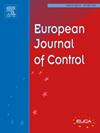Identification of piecewise affine systems using a cluster refinement technique
IF 2.5
3区 计算机科学
Q2 AUTOMATION & CONTROL SYSTEMS
引用次数: 0
Abstract
The identification of piecewise affine (PWA) systems is a challenging mixed integer optimization problem that involves both the estimation of the dynamics associated to different modes of operation, and the partition of the state space in regions associated to said modes, the transition from one region to another corresponding to a mode switching. The challenges are mainly associated with the sample-mode assignment task, because the combinatorial complexity increases with the size of the dataset. Furthermore, some samples are consistent with more than one mode, making their classification ‘ambiguous’. The identification problem is here addressed with a two-stage iterative method, alternating between an identification phase carried out over given clusters of data associated to regions in the state space (such that each cluster is assigned to a single mode), and a refinement phase, whereby the region borders are adjusted (by reassigning samples to other clusters) to improve the model quality. Operating on data clusters (as opposed to individual samples) significantly reduces the complexity of the combinatorial mode assignment problem, and naturally avoids region outliers (isolated samples surrounded by samples assigned to a different mode). However, this approach works properly only if accompanied by a cluster refinement procedure, responsible for reshaping the mode regions and reassigning stray samples to the correct modes. The combination of these two stages is ultimately successful in determining correctly both the local models and the associated state space regions, as shown here with reference to several benchmark examples.
用聚类改进技术识别分段仿射系统
分段仿射(PWA)系统的识别是一个具有挑战性的混合整数优化问题,它既涉及与不同操作模式相关的动力学估计,也涉及与所述模式相关的区域的状态空间划分,以及与模式切换对应的从一个区域到另一个区域的转换。这些挑战主要与样本模式分配任务有关,因为组合复杂性随着数据集的大小而增加。此外,一些样本符合不止一种模式,这使得它们的分类“模棱两可”。这里使用两阶段迭代方法来解决识别问题,在对与状态空间中的区域相关的给定数据簇执行的识别阶段(这样每个簇被分配到单个模式)和细化阶段之间交替进行,其中区域边界被调整(通过将样本重新分配到其他簇)以提高模型质量。对数据集群(而不是单个样本)进行操作显著降低了组合模式分配问题的复杂性,并且自然地避免了区域异常值(被分配到不同模式的样本包围的孤立样本)。然而,这种方法只有在集群细化过程中才能正常工作,该过程负责重塑模式区域并将杂散样本重新分配到正确的模式。这两个阶段的结合最终会成功地正确确定局部模型和相关的状态空间区域,如下面的几个基准示例所示。
本文章由计算机程序翻译,如有差异,请以英文原文为准。
求助全文
约1分钟内获得全文
求助全文
来源期刊

European Journal of Control
工程技术-自动化与控制系统
CiteScore
5.80
自引率
5.90%
发文量
131
审稿时长
1 months
期刊介绍:
The European Control Association (EUCA) has among its objectives to promote the development of the discipline. Apart from the European Control Conferences, the European Journal of Control is the Association''s main channel for the dissemination of important contributions in the field.
The aim of the Journal is to publish high quality papers on the theory and practice of control and systems engineering.
The scope of the Journal will be wide and cover all aspects of the discipline including methodologies, techniques and applications.
Research in control and systems engineering is necessary to develop new concepts and tools which enhance our understanding and improve our ability to design and implement high performance control systems. Submitted papers should stress the practical motivations and relevance of their results.
The design and implementation of a successful control system requires the use of a range of techniques:
Modelling
Robustness Analysis
Identification
Optimization
Control Law Design
Numerical analysis
Fault Detection, and so on.
 求助内容:
求助内容: 应助结果提醒方式:
应助结果提醒方式:


